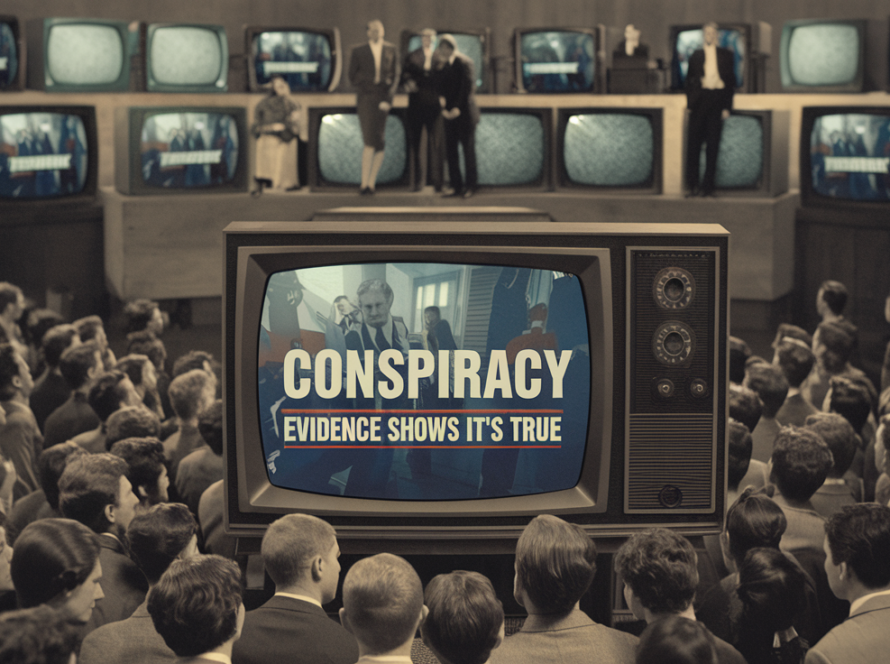The phrase “conspiracy theory” carries a powerful stigma. Often used to dismiss ideas as paranoid or fringe, it’s a term that evokes skepticism and distrust. But how did this phrase evolve, and why has it become such a potent tool for discrediting dissent? The history of “conspiracy theory” reveals its use as a rhetorical weapon, often aimed at silencing alternative narratives and reinforcing dominant power structures.
Origins of the Phrase
The term “conspiracy theory” dates back to the late 19th century, where it was initially used in a neutral sense to describe any theory about a potential conspiracy. However, it wasn’t until the mid-20th century that the phrase began to take on its current pejorative connotation.
According to historian Kathryn S. Olmsted, author of Real Enemies: Conspiracy Theories and American Democracy, World War I to 9/11, the phrase began to gain prominence during the Cold War era. As governments faced growing public scrutiny, especially in the wake of events like the Kennedy assassination and the Watergate scandal, the term “conspiracy theory” became a way to delegitimize criticisms of the official narrative. “Labeling someone a conspiracy theorist became a strategy to discredit their ideas without engaging with the substance of their claims,” Olmsted explains.
Weaponization During the 1960s and 1970s
One of the pivotal moments in the development of the modern understanding of “conspiracy theory” came after the assassination of President John F. Kennedy in 1963. The Warren Commission concluded that Lee Harvey Oswald acted alone, but many Americans were skeptical of this conclusion. Various theories emerged that suggested government involvement or cover-ups, which gained traction in popular culture.
In response, the CIA issued a dispatch in 1967 under the codename “1035-960” which encouraged its agents to discredit critics of the Warren Report by labeling them as “conspiracy theorists.” This was part of a broader strategy to counter public suspicion and prevent dissent from gaining momentum. According to the dispatch, the term was to be used to “employ propaganda assets to refute the attacks of the critics” and to suggest that those who questioned the official story were driven by irrational paranoia.
This CIA strategy effectively weaponized the term “conspiracy theory,” transforming it into a label that could be used to marginalize and discredit opposition, no matter how well-founded their arguments might be. The historian Lance deHaven-Smith, in his book Conspiracy Theory in America, argues that this moment marked the start of the term’s pejorative use: “The conspiracy theory label was a brilliant public relations move. It turned the tables on critics of the government, making them seem like the crazy ones.”
Dismissing Dissent: Key Cases
The phrase “conspiracy theory” has been used repeatedly to discredit dissent, often in ways that stifle legitimate inquiries into government actions. A few notable cases illustrate how this strategy has played out:
- The Watergate Scandal: Before the Watergate scandal became public knowledge, journalists investigating the Nixon administration’s illegal activities were often labeled as conspiracy theorists. When The Washington Post reporters Bob Woodward and Carl Bernstein began uncovering details of the break-in, White House officials attempted to paint them as paranoid and conspiratorial. It wasn’t until the scandal broke wide open that their claims were taken seriously.
- The Iran-Contra Affair: Similarly, early reports that the Reagan administration was involved in an illegal arms-for-hostages deal with Iran and was using the proceeds to fund Contra rebels in Nicaragua were dismissed as conspiracy theories. It wasn’t until an investigation revealed the full extent of the operation that the term lost its power to discredit those asking difficult questions.
- 9/11 and the War on Terror: After the September 11 attacks, individuals who questioned the U.S. government’s official narrative of the events were quickly labeled as conspiracy theorists. This label served to delegitimize any dissenting views, particularly those questioning the rationale for the invasion of Iraq. Historian Peter Dale Scott noted that the use of “conspiracy theory” in this context served as a “verbal weapon to prevent rational debate and inquiry into complex events.”
The Lasting Impact
The legacy of the phrase “conspiracy theory” continues to shape public discourse. By labeling dissenters as conspiracy theorists, powerful institutions can delegitimize and dismiss their critics, often without having to engage with the substance of their claims. The term has become a tool to police the boundaries of acceptable discourse, marginalizing those who challenge the status quo.
Experts like Michael Barkun, a political scientist who has studied conspiracy theories extensively, explain that the term is now “used to discredit any opposition to mainstream opinion, even when that opposition is grounded in legitimate critique.” This broad use of the term raises concerns about its impact on public debate and the ability to hold power to account.
In summary, the phrase “conspiracy theory” has a complex history. While it originally described ideas about potential conspiracies, it has since become a powerful tool for discrediting dissent. Understanding this evolution helps to reveal how language can be used to shape public perception and silence challenging narratives, ultimately impacting the transparency and accountability of those in power.


